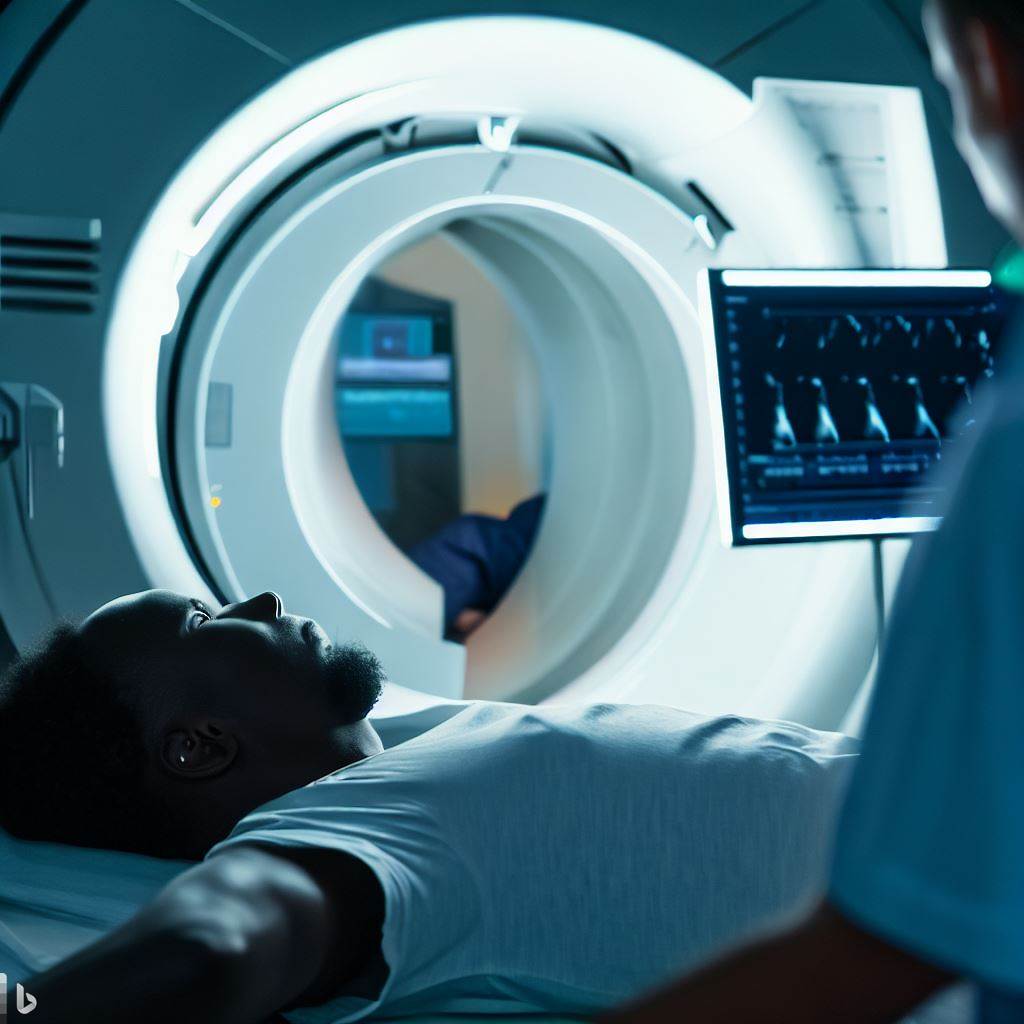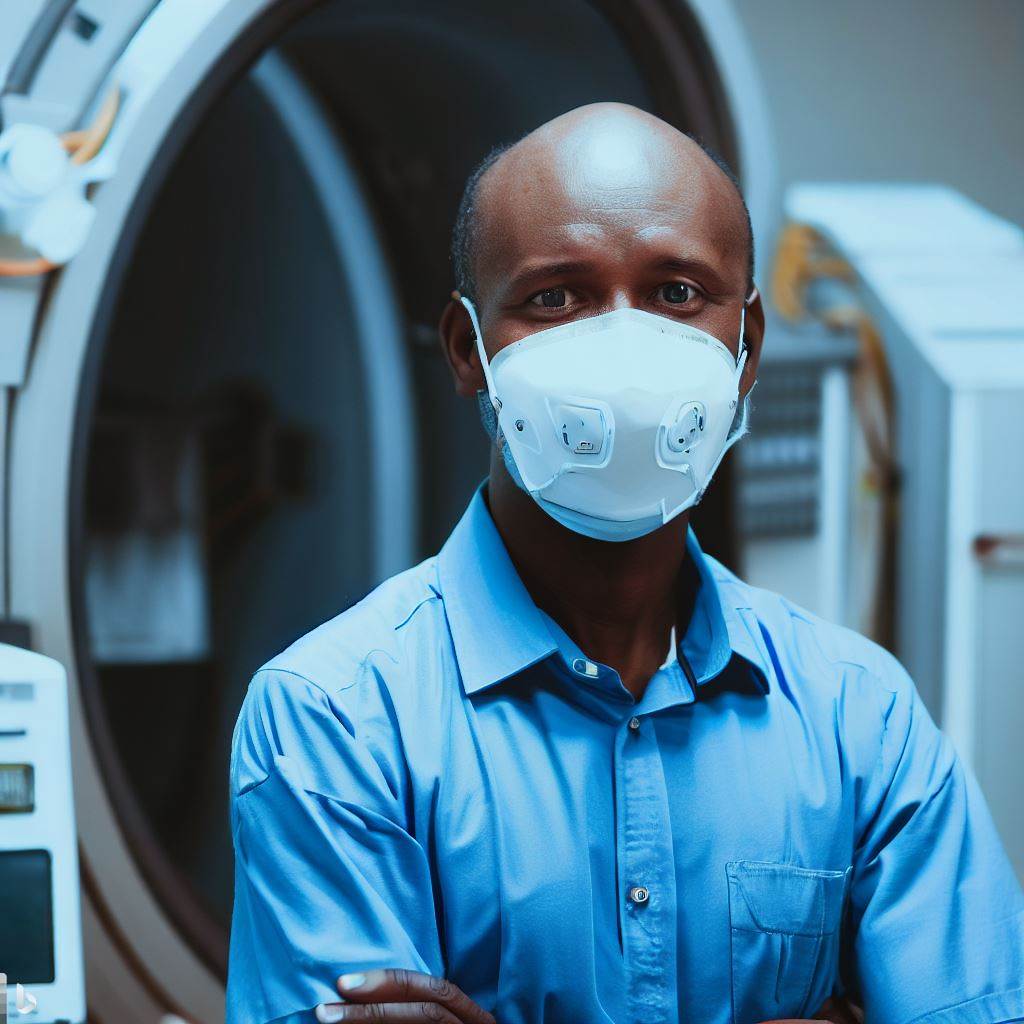Introduction
An MRI technologist holds a vital role in the healthcare field, primarily responsible for operating MRI scanners to produce detailed images of patients’ internal structures.
The valuable imaging skills possessed by MRI technologists aid in the diagnosis and monitoring of various medical conditions, enabling accurate and timely healthcare interventions.
This blog aims to shed light on the key skills essential for MRI technologists in Nigeria.
As the demand for advanced medical imaging continues to grow, the importance of these skilled professionals becomes even more significant.
From technical proficiency in MRI equipment operation to a deep understanding of anatomy, pathology, and patient care, MRI technologists must possess a diverse skill set to deliver precise and reliable imaging services.
Additionally, effective communication and patient management skills are critical for MRI technologists. They must be able to explain procedures to patients, address their concerns, and ensure their comfort during the scanning process.
Through this exploration of essential skills, we hope to underscore the significance of MRI technologists’ contributions in elevating healthcare services and patient outcomes in Nigeria.
Educational Requirements for MRI Technologists in Nigeria
The Need for a Specific Degree or Certification
Obtaining a specific degree or certification is essential for anyone aspiring to become an MRI Technologist.
These qualifications not only provide a solid foundation but also validate an individual’s expertise in operating MRI machines.
Employers in Nigeria often require candidates to hold at least a bachelor’s degree or higher in medical imaging or a related field.
Having a degree or certification is crucial to ensure competence and maintain patient safety during the MRI scanning process.
It also indicates a commitment to professional development and staying updated with the latest advancements in the field.
Recognized Institutions or Programs Offering MRI Technologist Training
Several recognized institutions in Nigeria provide comprehensive training programs for aspiring MRI technologists.
The University of Lagos offers a Bachelor of Medical Laboratory Science (BMLS) program with a specialization in Radiography and Radiological Sciences.
The University of Nigeria, Nsukka also offers a Bachelor of Radiography (B.Rad) program that includes MRI technologist training.
The Federal College of Radiography, Lagos, is a reputable institution offering specialized courses in MRI technology.
Other notable institutions in Nigeria providing MRI technologist training include Ahmadu Bello University, University of Port Harcourt, and University of Jos.
Additional Qualifications or Certifications
Although not mandatory, pursuing additional qualifications or certifications can greatly enhance an MRI technologist’s career prospects in Nigeria.
The Nigerian Institute of Radiographers (NIR) offers membership and a professional certification program for radiographers, including MRI technologists.
Membership with professional organizations such as the Radiographers Registration Board of Nigeria (RRBN) demonstrates commitment to ethical and professional practice.
Participating in workshops, conferences, and continuing education programs is highly recommended to stay abreast of the latest techniques and advancements in MRI technology.
Obtaining certifications from international bodies such as the American Registry of Radiologic Technologists (ARRT) can further enhance career opportunities both in Nigeria and abroad.
In summary, becoming an MRI Technologist in Nigeria requires specific educational qualifications and certifications.
A bachelor’s degree or higher in medical imaging or a related field is typically necessary. Recognized institutions like the University of Lagos and the University of Nigeria, Nsukka offer specialized programs in MRI technology.
Pursuing additional qualifications or certifications from professional organizations like the NIR or obtaining international certifications from bodies like the ARRT can significantly contribute to an MRI technologist’s professional growth in Nigeria.
Read: Agricultural Engineers: The Unsung Heroes of Nigeria
Technical Skills
In order to succeed as an MRI Technologist in Nigeria, it is crucial to possess strong technical skills.
These skills not only ensure accurate and high-quality MRI scans but also enable the technologist to effectively troubleshoot any technical issues that may arise.
Let’s take a closer look at the key technical skills required for an MRI Technologist in Nigeria.
Proficiency in operating MRI equipment
Understanding of MRI protocols and technical parameters
A skilled MRI Technologist must have a thorough understanding of the various MRI protocols used in medical imaging.
This knowledge allows them to select the appropriate protocol for different types of scans, ensuring optimal imaging results.
Additionally, they must be familiar with the technical parameters, such as field strength and imaging sequences, to adjust and optimize image acquisition.
Knowledge of various MRI imaging techniques
MRI Technologists should be well-versed in different MRI imaging techniques, such as T1-weighted, T2-weighted, and FLAIR imaging.
This expertise enables them to select the most appropriate technique for different clinical indications, enhancing the diagnostic value of the scans.
Experience in image interpretation and analysis
Evaluation and assessment of MRI scans
MRI Technologists must possess excellent skills in evaluating and assessing MRI scans. This includes the ability to identify normal anatomical structures and differentiate them from potential abnormalities or pathological findings.
Accurate evaluation is crucial for providing accurate reports to radiologists or physicians.
Identification of abnormalities or anomalies
Another critical skill for an MRI Technologist is the ability to accurately identify abnormalities or anomalies in MRI images.
This requires comprehensive knowledge of normal anatomy and a sharp eye for subtle variations or anomalies that may indicate pathological conditions.
Ability to troubleshoot technical issues related to MRI machines
An MRI Technologist should be proficient in troubleshooting technical issues that may arise while operating MRI machines.
This includes identifying and resolving equipment malfunctions, software glitches, or other technical challenges that may affect image quality or system performance.
Quick problem-solving skills ensure minimal downtime and maintain smooth workflow in a diagnostic imaging center.
In summary, a skilled MRI Technologist in Nigeria must possess a range of technical skills to excel in their role.
Proficiency in operating MRI equipment, understanding MRI protocols and technical parameters, knowledge of imaging techniques, experience in image interpretation and analysis, and the ability to troubleshoot technical issues are all essential for ensuring accurate and high-quality MRI scans.
By honing these technical skills, MRI Technologists play a vital role in supporting accurate diagnoses and improving patient care.
Read: Challenges and Rewards of Phlebotomy in Nigeria

Patient Care and Safety Skills
Effective communication with patients
It is crucial for an MRI technologist in Nigeria to have excellent communication skills to interact with patients.
They need to explain the MRI procedure and set realistic expectations for patients.
Addressing patient concerns or fears is essential to ensure their comfort and cooperation during the scan.
Application of proper safety measures
Having a deep understanding of magnetic safety precautions is imperative to prevent accidents and injuries.
Awareness of contrast agent administration guidelines is crucial to administer them safely and avoid adverse reactions.
As an MRI technologist in Nigeria, patient care and safety skills play a vital role in providing optimal healthcare services.
Here, we will discuss the key aspects of effective communication with patients and the application of proper safety measures.
Effective communication with patients
One of the primary responsibilities of an MRI technologist is to establish effective communication with patients. This skill is crucial in building trust and ensuring a smooth MRI scanning process.
- Explanation of MRI procedure and expectations: Patients may feel anxious or uncertain about the MRI procedure.
An MRI technologist should be able to explain the process and set realistic expectations for the patient. This includes informing them about the duration, potential discomfort, and specific instructions they need to follow. - Addressing patient concerns or fears: Some patients may have claustrophobia or other fears related to the MRI scan. The technologist should be able to address these concerns and provide reassurance. They should offer support and guidance throughout the procedure to minimize anxiety and discomfort.
By effectively communicating with patients, an MRI technologist can help them feel more at ease, enhancing the overall patient experience and cooperation during the scan.
Read: Occupational Therapy Schools: Where to Study in Nigeria
Application of proper safety measures
Ensuring patient safety is a top priority for MRI technologists. By following proper safety measures, they can minimize the risk of accidents, injuries, and adverse reactions.
- Knowledge of magnetic safety precautions: MRI scanners generate a strong magnetic field, which can pose risks.
Technologists must have a comprehensive understanding of magnetic safety precautions, such as removing ferromagnetic objects from the scanning area and screening patients for implants or devices that may be affected by the magnetic field. - Awareness of contrast agent administration guidelines: Contrast agents may be administered to enhance the visibility of certain body tissues during an MRI scan.
MRI technologists need to be aware of the guidelines for contrast agent administration, including proper dosage, preparation, and potential allergic reactions. Adhering to these guidelines ensures patient safety and accurate imaging results.
By applying proper safety measures, MRI technologists contribute to the prevention of accidents and adverse events, while ensuring the overall well-being of their patients.
In general, patient care and safety skills are fundamental for MRI technologists in Nigeria. Effective communication with patients, including explaining the MRI procedure and addressing concerns, promotes trust and cooperation.
Furthermore, the application of proper safety measures, such as adhering to magnetic safety precautions and contrast agent administration guidelines, ensures patient safety during the scanning process. By continuously honing these key skills, MRI technologists can provide the highest quality of care to their patients in Nigeria.
Interpersonal and Professional Skills
Interpersonal and professional skills play a crucial role in the successful career of an MRI technologist in Nigeria.
These skills are vital for effective collaboration with the healthcare team and for ensuring attention to detail and accuracy in patient care.
Collaboration with healthcare team members
To provide the best possible care for patients, MRI technologists must collaborate with various healthcare team members.
This collaboration involves coordination with radiologists or physicians. MRI technologists need to communicate effectively with these professionals to understand the specific imaging requirements for each patient.
By working together, they can ensure accurate and timely diagnosis.
In addition to radiologists and physicians, MRI technologists also need to work as a part of a larger medical team.
Effective teamwork with nurses, medical assistants, and other professionals is essential in providing comprehensive patient care.
MRI technologists should be able to communicate clearly, listen actively, and contribute their expertise to the team.
Attention to detail and accuracy
Attention to detail and accuracy are crucial skills for an MRI technologist. These skills are essential in ensuring precise positioning of patients for optimal imaging.
MRI scans require patients to be positioned correctly to obtain clear and accurate images. A small error in positioning can lead to false results and compromise the quality of the diagnosis.
Therefore, MRI technologists must pay close attention to detail and follow the specific protocols for each scan.
Furthermore, MRI technologists are responsible for ensuring the accuracy of patient information and documentation. They must carefully review and verify patient data to avoid any mistakes or discrepancies.
Accurate documentation is important for maintaining a patient’s medical history and ensuring proper follow-up care.
MRI technologists should have the ability to organize and document information accurately, paying attention to even the smallest details.
In fact, interpersonal and professional skills are essential for an MRI technologist in Nigeria.
Collaboration with healthcare team members, such as radiologists and physicians, enables effective communication and optimal patient care.
Attention to detail and accuracy play a significant role in precise positioning of patients and maintaining accurate patient information.
Developing and honing these skills is crucial for MRI technologists to excel in their profession and provide high-quality care to patients.
Read: Top Institutions to Study Phlebotomy in Nigeria
Professional Development and Continuing Education
Importance of staying updated with technological advancements in MRI
- Continuous learning is essential for MRI technologists in Nigeria to keep up with evolving technology.
- Staying updated ensures accurate diagnosis, improves patient care, and boosts career opportunities.
- Technological advancements can lead to improved image quality, faster scans, and better patient experiences.
- Understanding and utilizing the latest MRI techniques can enhance diagnostic capabilities and yield more accurate results.
- Ongoing professional development helps MRI technologists provide the highest standard of care to their patients.
Mention professional organizations or associations related to MRI technologists in Nigeria
The Nigerian Association of Radiographers and Radiologic Technologists (NARRT) is a prominent organization supporting MRI technologists.
Membership in NARRT offers access to resources, networking opportunities, and professional development initiatives.
Association of Radiographers of Nigeria (ARN) is another organization that supports and represents MRI technologists in the country.
ARN provides platforms for collaboration, knowledge sharing, and staying updated with the latest practices in the field.
Both NARRT and ARN serve as platforms for professional growth and advancing the interests of MRI technologists.
Opportunities for further training, workshops, or conferences
MRI technologists in Nigeria can benefit from attending workshops and conferences on advanced imaging techniques.
These events provide a platform for learning, exchanging ideas, and staying updated with the latest developments in the field.
International conferences like the African Congress of Radiology and the World Federation of MRI Technologists Conference offer valuable opportunities.
Professional training programs, such as the Advanced Certificate in MRI, can enhance specialized skills and career prospects.
MRI technologists should actively seek out opportunities for continuous professional development to remain competitive and provide quality care.
Continuing education and professional development are essential for MRI technologists in Nigeria as MRI technology evolves.
Advancements in MRI have improved image quality, reduced scan times, and enhanced patient experiences.
Staying updated with the latest techniques and technologies is crucial for accurate diagnoses and optimal patient care.
Professional organizations like NARRT and ARN provide platforms for knowledge sharing and networking.
Attending workshops, conferences, and training programs offers opportunities to learn about advanced imaging techniques and gain hands-on experience with modern equipment.
Acquiring additional qualifications, such as the Advanced Certificate in MRI, opens doors to new career opportunities and enhances expertise.
Overall, professional development is imperative for MRI technologists in Nigeria to provide high-quality care and remain competitive in the rapidly evolving field of MRI technology.
Read: Future Prospects: The Evolution of Pharmacy in Nigeria
Conclusion
An MRI technologist in Nigeria must master MRI machine operation and imaging techniques.
Profound grasp of anatomy, physiology, and pathology is vital for accurate scan interpretation. Effective patient interaction demands superb communication and interpersonal aptitude, while meticulous safety adherence is essential.
Moreover, adept problem-solving skills enable technologists to address technical challenges and ensure optimal scan outcomes.
MRI technologists play a crucial role in diagnosing and monitoring various medical conditions. Their expertise helps physicians make accurate treatment decisions, improving patient outcomes.
By acquiring and honing the necessary skills, aspiring MRI technologists can contribute to the advancement of healthcare in Nigeria while ensuring their professional growth and job satisfaction.




